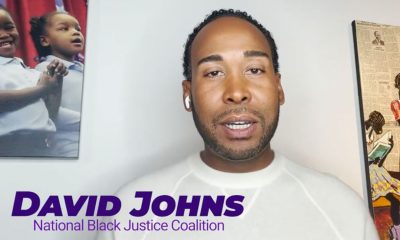National
Missouri Police Stopped Blacks More Than Whites in 2014

Protestors blocking Florissant Road raise their hands after being approached by police officers who asked them to stop blocking the street in front of the Ferguson police department on Sunday, Aug. 10, 2014, one day after a Ferguson officer shot and killed Michael Brown. (AP Photo/St. Louis Post-Dispatch, Robert Cohen)
JIM SUHR, Associated Press
ST. LOUIS (AP) — The disparity in the rate at which Missouri authorities pulled over black drivers compared with whites last year surged to its highest level since the state began compiling data 15 years ago, the state’s top law enforcer said Monday.
Attorney General Chris Koster’s annual report analyzing traffic stops by race found that African-American drivers were 75 percent more likely than white motorists to be stopped on Missouri’s roads based on their proportionate share of the driving-age population. That’s nine percentage points higher than last year. In 2000, blacks were 31 percent more likely than whites to be pulled over.
The report is Missouri’s first since the racial unrest that followed the shooting death last August in Ferguson of Michael Brown, a black, unarmed 18-year-old, by a white police officer. Koster’s report shows that black drivers in the predominantly black St. Louis suburb were stopped last year at a disparity rate lower than the statewide average.
Koster cautioned that with 622 law enforcement agencies, there is no single explanation as to why the disparities exist and that the statistics don’t prove law officers are making vehicle stops based on the driver’s race. But Koster said in a statement that his office’s analysis of nearly 1.7 million 2014 traffic stops “provides law enforcement, legislators and the public a starting point as they consider improvements to process and changes to policy to address these issues.”
Law enforcement officers say racial disparities in traffic stops may appear higher in some predominantly white cities because of interstate highways or retail and tourist destinations that attract minority drivers who are not part of the local population.
The report shows that Hispanic drivers were stopped at a lower rate than white or black drivers. Law officers searched Hispanic and black drivers at a higher rate than white drivers. But of those who were searched, whites were found with contraband at a higher rate than black and Hispanic drivers.
Roughly five dozen law enforcement agencies indicated they made no traffic stops last year, Koster said.
Even though Ferguson fared better than the statewide average, that city’s policing and municipal courts were widely scrutinized after Brown’s shooting death touched off angry, sometimes violent protests. The case also led to demonstrations in other cities and spawned a national “Black Lives Matter” movement seeking changes in how police deal with minorities.
A grand jury and the Justice Department cleared the white officer in Brown’s death, but the federal agency did release a scathing report that cited racial bias and profiling in Ferguson policing and in a profit-driven municipal court system that frequently targeted blacks.
Ferguson’s police chief, municipal court judge and city manager resigned following the Justice Department’s probe.
Copyright 2015 The Associated Press. All rights reserved. This material may not be published, broadcast, rewritten or redistributed.
Activism
U.S. House Minority Leader Hakeem Jeffries Speaks on Democracy at Commonwealth Club
Based on his first speech as House minority leader, “The ABCs of Democracy” by Grand Central Publishing is an illustrated children’s book for people of all ages. Each letter contrasts what democracy is and isn’t, as in: “American Values over Autocracy”, “Benevolence over Bigotry” and “The Constitution over the Cult.”

By Linda Parker Pennington
Special to The Post
House Minority Leader Hakeem Jeffries addressed an enthusiastic overflow audience on Monday at San Francisco’s Commonwealth Club, launching his first book, “The ABCs of Democracy.”
Based on his first speech as House minority leader, “The ABCs of Democracy” by Grand Central Publishing is an illustrated children’s book for people of all ages.
Each letter contrasts what democracy is and isn’t, as in: “American Values over Autocracy”, “Benevolence over Bigotry” and “The Constitution over the Cult.”
Less than a month after the election that will return Donald Trump to the White House, Rep. Jeffries also gave a sobering assessment of what the Democrats learned.
“Our message just wasn’t connecting with the real struggles of the American people,” Jeffries said. “The party in power is the one that will always pay the price.”
On dealing with Trump, Jeffries warned, “We can’t fall into the trap of being outraged every day at what Trump does. That’s just part of his strategy. Remaining calm in the face of turmoil is a choice.”
He pointed out that the razor-thin margin that Republicans now hold in the House is the lowest since the Civil War.
Asked what the public can do, Jeffries spoke about the importance of being “appropriately engaged. Democracy is not on autopilot. It takes a citizenry to hold politicians accountable and a new generation of young people to come forward and serve in public office.”
With a Republican-led White House, Senate, House and Supreme Court, Democrats must “work to find bi-partisan common ground and push back against far-right extremism.”
He also described how he is shaping his own leadership style while his mentor, Speaker-Emeritus Nancy Pelosi, continues to represent San Francisco in Congress. “She says she is not hanging around to be like the mother-in-law in the kitchen, saying ‘my son likes his spaghetti sauce this way, not that way.’”
Activism
MacArthur Fellow Dorothy Roberts’ Advocates Restructure of Child Welfare System
Roberts’s early work focused on Black women’s reproductive rights and their fight for reproductive justice. In “Killing the Black Body: Race, Reproduction, and the Meaning of Liberty 1997)”, she analyzes historical and contemporary policies and practices that denied agency to Black women and sought to control their childbearing—from forced procreation during slavery, to coercive sterilization and welfare reform—and advocates for an expanded understanding of reproductive freedom.

Special to The Post
When grants were announced Oct. 1, it was noted that eight of the 22 MacArthur Fellows were African American. Among the recipients of the so-called ‘genius grants’ are scholars, visual and media artists a poet/writer, historian, and dancer/choreographer who each receive $800,000 over a five-year period to spend as they see fit.
Their names are Ruha Benjamin, Jericho Brown, Tony Cokes, Jennifer L. Morgan, Ebony G. Patterson, Shamel Pitts, Jason Reynolds, and Dorothy Roberts. This is the eighth and last in the series highlighting the Black awardees. The report below on Dorothy Roberts is excerpted from the MacArthur Fellows web site.
A graduate of Yale University with a law degree from Harvard, Dorothy Roberts is a legal scholar and public policy researcher exposing racial inequities embedded within health and social service systems.
Sine 2012, she has been a professor of Law and Sociology, and on the faculty in the department of Africana Studies at the University of Pennsylvania.
Roberts’s work encompasses reproductive health, bioethics, and child welfare. She sheds light on systemic inequities, amplifies the voices of those directly affected, and boldly calls for wholesale transformation of existing systems.
Roberts’s early work focused on Black women’s reproductive rights and their fight for reproductive justice. In “Killing the Black Body: Race, Reproduction, and the Meaning of Liberty 1997)”, she analyzes historical and contemporary policies and practices that denied agency to Black women and sought to control their childbearing—from forced procreation during slavery, to coercive sterilization and welfare reform—and advocates for an expanded understanding of reproductive freedom.
This work prompted Roberts to examine the treatment of children of color in the U.S. child welfare system.
After nearly two decades of research and advocacy work alongside parents, social workers, family defense lawyers, and organizations, Roberts has concluded that the current child welfare system is in fact a system of family policing with alarmingly unequal practices and outcomes. Her 2001 book, “Shattered Bonds: The Color of Child Welfare,” details the outsized role that race and class play in determining who is subject to state intervention and the results of those interventions.
Through interviews with Chicago mothers who had interacted with Child Protective Services (CPS), Roberts shows that institutions regularly punish the effects of poverty as neglect.
CPS disproportionately investigates Black and Indigenous families, especially if they are low-income, and children from these families are much more likely than white children to be removed from their families after CPS referral.
In “Torn Apart: How the Child Welfare System Destroys Black Families—and How Abolition Can Build a Safer World (2022),” Roberts traces the historical, cultural, and political forces driving the racial and class imbalance in child welfare interventions.
These include stereotypes about Black parents as negligent, devaluation of Black family bonds, and stigmatization of parenting practices that fall outside a narrow set of norms.
She also shows that blaming marginalized individuals for structural problems, while ignoring the historical roots of economic and social inequality, fails families and communities.
Roberts argues that the engrained oppressive features of the current system render it beyond repair. She calls for creating an entirely new approach focused on supporting families rather than punishing them.
Her support for dismantling the current child welfare system is unsettling to some. Still, her provocation inspires many to think more critically about its poor track record and harmful design.
By uncovering the complex forces underlying social systems and institutions, and uplifting the experiences of people caught up in them, Roberts creates opportunities to imagine and build more equitable and responsive ways to ensure child and family safety.
Activism
Oakland Post: Week of December 18 – 24, 2024
The printed Weekly Edition of the Oakland Post: Week of December 18 – 24, 2024

To enlarge your view of this issue, use the slider, magnifying glass icon or full page icon in the lower right corner of the browser window. ![]()
-

 Activism4 weeks ago
Activism4 weeks agoOakland Post: Week of November 20 – 26, 2024
-

 California Black Media4 weeks ago
California Black Media4 weeks agoCalifornia to Offer $43.7 Million in Federal Grants to Combat Hate Crimes
-

 Black History4 weeks ago
Black History4 weeks agoEmeline King: A Trailblazer in the Automotive Industry
-

 California Black Media4 weeks ago
California Black Media4 weeks agoCalifornia Department of Aging Offers Free Resources for Family Caregivers in November
-

 California Black Media4 weeks ago
California Black Media4 weeks agoGov. Newsom Goes to Washington to Advocate for California Priorities
-

 Activism4 weeks ago
Activism4 weeks agoOCCUR Hosts “Faith Forward” Conference in Oakland
-

 Activism3 weeks ago
Activism3 weeks agoOakland Post: Week of November 27 – December 3, 2024
-

 Activism4 weeks ago
Activism4 weeks agoRichmond Seniors Still Having a Ball After 25 Years
























































